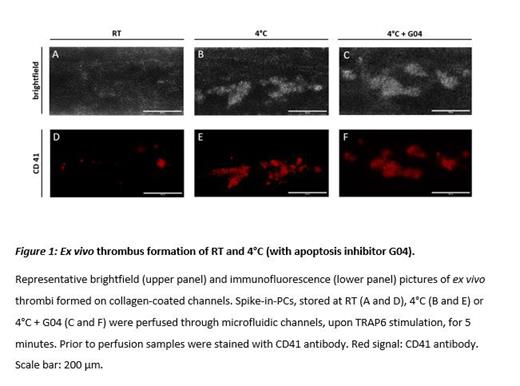Introduction: Platelet concentrates (PCs) are used to treat or prevent bleeding in patients with impaired platelet function or after injury. However, the standard storage of PCs at room-temperature (RT) increases the risk of bacterial contamination and is associated with reduced platelet functionality due to storage lesions. Our group reported that cold-stored PCs have better functionality compared to RT-stored PCs but reduced in vivo circulation time due to cold-induced apoptosis. In order to investigate cold-stored PCs hemostatic functionality with and without apoptosis inhibition, we established an ex vivo model simulating physiological conditions of blood flow to evaluate the contribution of cold-stored PCs in thrombus formation.
Methods: Apheresis-derived PCs were stored for 1, 4, 7 and 10 days under agitation at 4°C or RT either with or without the apoptosis inhibitor G04 (RhoA GTPase inhibitor). Next, PCs were stained with CD41 antibody, recalcified and incubated with TRAP6 (thrombin receptor-activating peptide 6) to initiate thrombus formation. Platelet-depleted whole blood samples from healthy donors were spiked-in with PCs and administered to the microfluidic channels of the ex vivo system (Bioflux), under physiological shear pressure. After five minutes of perfusion the resulting thrombi were imaged and analyzed. Ability to form thrombi was further assessed by thromboelastography and impedance aggregometry.
Results: Platelets from 24h storage PCs showed stable thrombus formation upon activation with TRAP6. Unstimulated platelets did not form any thrombi during the entire period of perfusion. To evaluate the effect of cold storage on platelet functions we analyzed the extent of thrombus formation of PCs stored at RT and 4°C upon CD41 staining. Our results indicate that cold-stored platelets form larger clots under flow conditions and maintain higher functionality compared to PCs stored at RT. Moreover, incubation of cold-stored PCs with the apoptosis inhibitor G04 improved ex vivo thrombus formation compared to PCs stored without the inhibitor, without inducing any adverse effects (Figure 1).
Conclusion: The results indicate that our ex vivo assay, which simulates PC transfusion in thrombocytopenic patients, is suitable to test the hemostatic functions of PCs under physiological flow conditions. We demonstrated that PCs stored at 4°C show better thrombus formation ability upon stimulation by agonists compared to RT-stored PCs and that the ability to form clots under shear stress is still preserved after incubation with the apoptosis inhibitor.
To conclude, cold-storage of PCs in combination with apoptosis inhibition is a promising stragedy to reduce the risk of bacterial contamination and prolong in vivo survival time while preserving platelet's hemostatic functionality.
Disclosures
No relevant conflicts of interest to declare.


This feature is available to Subscribers Only
Sign In or Create an Account Close Modal